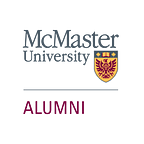Celebrating a cautious centennial
ALLYSON ROWLEY | SEPTEMBER 14, 2018
On May 24, 1918, most (but not all) women in Canada were granted the right to vote in a federal election. One hundred years later, how much closer are we to gender parity? A McMaster expert meets with the president of the McMaster Students Union to talk about the franchise, the glass cliff and the future.
“Stop your game, my dear,
For pity’s sake give over.
You do not want a vote at all,
You only want a lover…”
Among the treasures housed in McMaster’s William Ready Division of Archives and Research Collections is this “Valentine to a Suffragette.” Penned by an anonymous (and presumably male) wit of the early 20th century, the ditty expresses the prevailing attitude of the times. For decades, men and women alike resisted the silly notion that women should be allowed to vote in a society in which they also worked, volunteered and paid taxes. Until 1918, that is, when the right to vote was granted in federal elections.
“To my surprise, we’ve seen very little commemoration of this 100th anniversary,” says Karen Bird, who explains that no other piece of legislation enfranchised so large a proportion of Canadians. Bird is quick to note, however, that many women and men continued to be subject to racial and Indigenous exclusions — and equal voting rights across all the provinces and territories was another milestone that had to wait many more decades.
Nonetheless, the 1918 legislation “is important symbolically,” says Bird, “as a marker of advancement in democratic rights.”
A professor and chair of the Department of Political Science (the first female chair, in fact), Bird studies the political representation of women and ethnic minorities around the world. And in her final year as an undergraduate at Wilfrid Laurier, she was the second female student union president ever elected.
Ikram Farah ’18 is the sixth female president of the McMaster Students Union, out of 131 predecessors. But don’t let that define her. “I’d like to be recognized for the things I accomplish,” says Farah, who graduated in June with a double degree in labour studies and political science.
Farah ran a confident campaign, easily winning all seven rounds of voting. A first-generation student, she credits Mac for its diversity and its sense of community. “McMaster really solidified for me what it means to be a leader.”
Farah notes another first for this year’s student union: a majority female board. Two of her three vice-presidents are female. She’s well aware, though, both from her own experience (she’s worked since Grade 9) and her labour studies program, that “the higher you go, the more male-dominated it is.”
Farah mentions the concept of “the glass cliff,” where women are more likely to achieve leadership roles during times of crisis, when the chance of failure is highest. Bird echoes this, noting that no female premier in Canada has been re-elected.
And despite the much-touted federal cabinet picks of 2015, where do we stand on the world stage? At press time, Canada ranks 60th in the world for gender parity in national parliaments. (Rwanda, Cuba and Bolivia are the top three.)
“A hundred years of suffrage is a good moment to think about what we still have to do. It may seem that equality has been accomplished, but it hasn’t,” says Bird. “We need to recognize unconscious bias and push past it.”
“We need to unlearn,” adds Farah, who isn’t one to let obstacles stand in her way. After all, when she applied for volunteer positions in her first year at Mac, she was rejected 18 times.
“I like questioning things,” says Farah. “That’s why I became involved in politics.”
More from MAC Magazine
